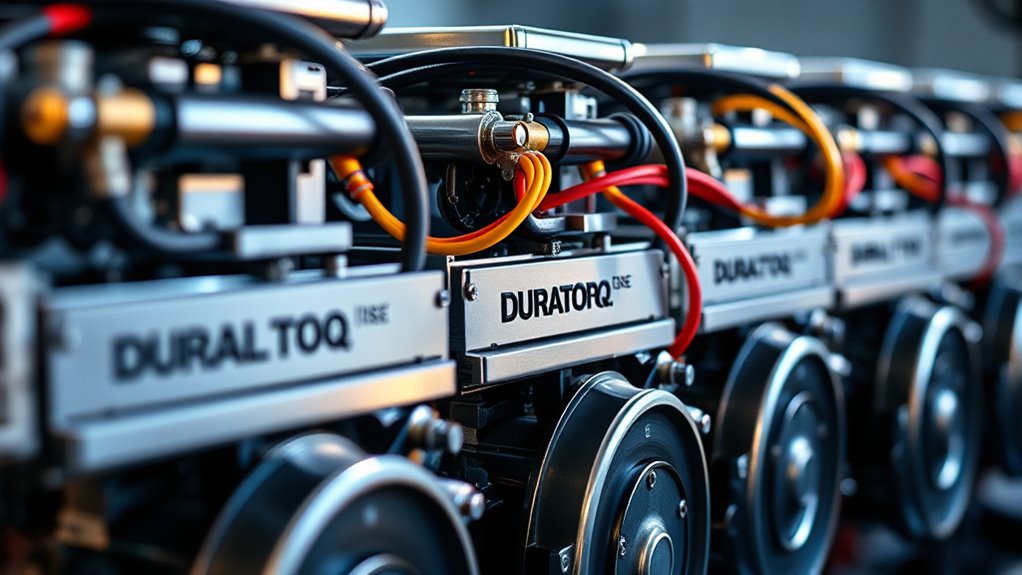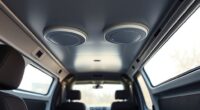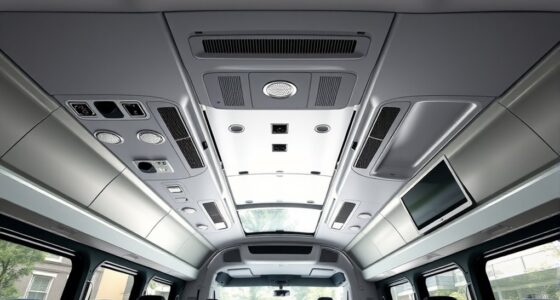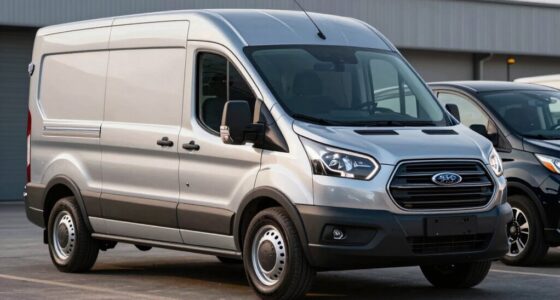Ford’s transit diesel engines have shifted from the reliable Duratorq lineup to the more eco-friendly EcoBlue series. You’ll notice EcoBlue engines deliver cleaner emissions, improved fuel efficiency, and quieter operation, all while maintaining strong performance and durability. This shift helps meet stricter environmental standards and supports long-term fleet savings. If you want to understand how these changes impact your vehicle’s reliability and efficiency, there’s more to explore.
Key Takeaways
- Ford Transit’s Duratorq engines range from 2.2L to 3.2L, known for durability and reliable low-end torque.
- EcoBlue engines replace Duratorq, offering improved emissions, fuel efficiency, and advanced turbocharging technology.
- EcoBlue models maintain performance standards while meeting stricter environmental regulations.
- Transition reflects Ford’s focus on sustainability, reducing emissions without compromising engine reliability.
- The shift enhances fleet management with diagnostics and supports future regulatory compliance.
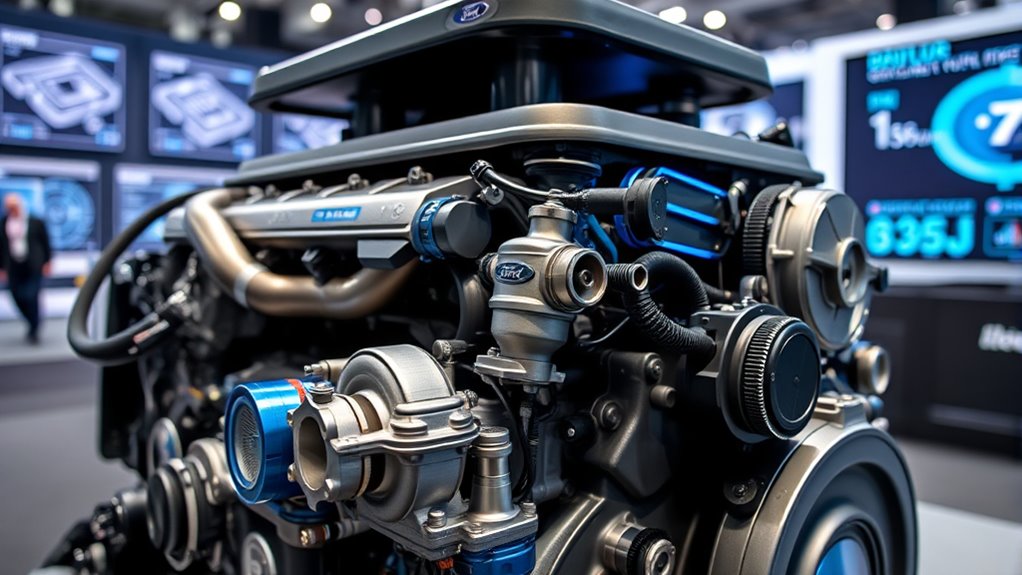
Are you considering a reliable and fuel-efficient power source for your transit needs? If so, diesel engines are a solid choice, offering durability, power, and better fuel economy compared to many alternatives. Over the years, diesel technology has evolved markedly, especially within the Ford Transit lineup. You might be familiar with the Duratorq engines, which have long been the backbone of Ford’s commercial vehicles. These engines are known for their robustness, longevity, and consistent performance, making them ideal for transit applications where reliability is essential.
Duratorq engines come in various configurations, from smaller 2.2-liter variants to larger 3.2-liter models, each designed to meet different power and efficiency requirements. They deliver strong torque at low RPMs, which is vital for carrying heavy loads and frequent stop-and-go driving typical in transit services.
However, Ford has been shifting towards more advanced, environmentally friendly technology with the EcoBlue engine lineup. The EcoBlue engines are built to meet stricter emissions standards while maintaining the performance and fuel efficiency that transit operators need. These engines incorporate innovations like turbocharging and high-pressure direct injection, which optimize combustion efficiency and reduce emissions.
The result is a cleaner-running engine that doesn’t sacrifice power or economy. EcoBlue engines are also designed with durability in mind, featuring improvements such as reinforced components and better thermal management to withstand the rigors of daily transit operations. This makes them a compelling option for fleets looking to reduce their environmental footprint without compromising on performance.
Transitioning from Duratorq to EcoBlue reflects Ford’s commitment to sustainability and technological innovation. EcoBlue engines are compatible with advanced diagnostics and telematics systems that help you monitor engine health, optimize maintenance schedules, and improve overall fleet management.
They also tend to produce less noise and vibration, enhancing driver comfort and passenger experience. Fuel economy improvements are noteworthy, especially in city driving conditions, where the efficiency gains can translate into substantial cost savings over time.
As emissions standards continue to tighten globally, EcoBlue engines are positioned as future-proof solutions that align with regulatory requirements while supporting your operational goals.
Frequently Asked Questions
How Do Ecoblue Engines Compare to Diesel Hybrids?
EcoBlue engines generally offer better fuel efficiency and lower emissions compared to diesel hybrids, making them ideal if you prioritize consistent performance and reduced environmental impact.
Hybrids combine a diesel engine with an electric motor, providing extra fuel savings during city driving.
However, EcoBlue engines are simpler, more reliable, and often have lower maintenance costs.
If you want straightforward, eco-friendly power, EcoBlue engines are a solid choice over hybrids.
What Maintenance Differences Exist Between Duratorq and Ecoblue Engines?
You’ll find that EcoBlue engines generally require less maintenance compared to Duratorq engines. They benefit from advanced emissions controls, which reduce soot buildup and lower engine strain.
EcoBlue engines also feature improved fuel efficiency and more durable components, meaning fewer oil changes and less frequent servicing. However, when repairs are needed, parts may be be more expensive due to their sophisticated technology.
Are Ecoblue Engines Suitable for Off-Road Commercial Use?
Yes, EcoBlue engines are suitable for off-road commercial use. They deliver robust performance, improved fuel efficiency, and cleaner emissions, making them ideal for rugged conditions.
You’ll find that EcoBlue engines handle off-road terrains well, thanks to their advanced turbocharging and durability features. Just guarantee proper maintenance, and these engines will serve your off-road needs reliably, providing the power and efficiency required for demanding commercial applications.
How Do Fuel Efficiency Ratings Vary Across Ecoblue Models?
EcoBlue models generally offer improved fuel efficiency, but ratings can vary depending on engine size and vehicle usage. You might worry about performance, yet these engines are designed for peak economy without sacrificing power.
Smaller EcoBlue engines excel in city driving, while larger ones suit highway and off-road tasks. By choosing the right EcoBlue variant for your needs, you’ll enjoy better mileage and lower operating costs, making your work more efficient.
What Are the Future Developments Planned for Ford Transit Diesel Engines?
Ford plans to enhance its Transit diesel engines by improving efficiency and reducing emissions further. You can expect future EcoBlue models to feature advanced turbocharging, better fuel economy, and lower CO2 outputs.
Ford also aims to integrate more hybrid and electric technologies, making your transit more environmentally friendly and cost-effective. These developments will help you meet stricter regulations while maintaining reliable performance on the road.
Conclusion
You’ll find that Ford’s Duratorq and EcoBlue engines showcase impressive advancements, with EcoBlue engines offering up to 13% better fuel efficiency than previous models. This means you can enjoy more miles per gallon while reducing emissions. As diesel engine technology evolves, you get a reliable, powerful performance that’s also environmentally friendly. Embracing these innovations helps you stay efficient and responsible on every journey, proving that modern diesel engines are truly a smart choice for your Transit.
